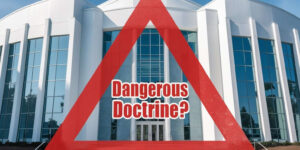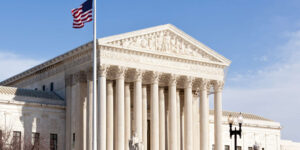Rioting Muslim Mobs Attack Pakistan Church
Hundreds of Muslims in Gujranwala on Saturday (April 30) attacked Christians’ homes, a school and a Presbyterian church building after learning that police had released two Christians accused of “blasphemy”—amid reports of another alleged desecration of the Quran.
Mushtaq Gill and his son Farrukh Mushtaq were released on Friday afternoon (April 29) after a handwriting expert hired by police determined that the latter had not written a threatening note accompanying burned pages of the Quran, police sources said. The two Christians, who had been taken into protective custody on April 15, were relocated along with family members to an undisclosed location soon after their release.
At 7:30 a.m. on Saturday morning (April 30), however, as news of their release spread, a Muslim claimed that pages of the Quran had been burned anew in Gujranwala’s Aziz Colony cemetery in Punjab Province, according to retired Maj. Timothy Nasir, head of Faith Theological Seminary in Gujranwala. He said announcements over area mosque loudspeakers began blaring, and Muslim residents and members of extremist groups began gathering.
A mob started rioting and hurling rocks at the Christians’ homes and at an elementary school owned by a Christian, Eric Isaac, who was among eight Christians police took into custody for questioning, police said. The mob also pelted the Aziz Colony Presbyterian Church building, they said. Armed with clubs and batons, the protestors clashed with police who arrived to provide security to the besieged Christians.
At least 18 people—15 Muslim protestors and three policemen—were injured and had to be hospitalized after officers used tear gas and batons to disperse the mob, police sources said. There were no reports of injured Christians.
The protesting Muslims then moved towards government offices and set tires on fire on the main Gujranwala-Sialkot road, blocking traffic for hours. They also tried to attack the Gujranwala Range regional police office, but officers thwarted their plans, police sources said.
Around 150 protestors were arrested, with two cases registered against them for attacking Christian property and “creating a law and order situation,” police said. The remaining protestors dispersed after senior police officials assured them that they would find “the real perpetrators” of the first alleged Quran burning within three days.
Nasir told Compass by telephone that the riots compelled a large number of Christian families to flee, as they feared the kind of large-scale violence that occurred in Gojra on Aug. 1, 2009, when at least seven Christians were burned alive by Muslim mobs after the spread of a rumor of blasphemy.
“There are about 3,000 Christian families living in the area comprising Aziz Colony, Gulzar Colony, Islam Colony and Khokharki,” Nasir said. “We have been living peacefully with the Muslims for more than 125 years, but the circumstances arising out of the false allegations against Mushtaq and his son Farrukh have changed the situation altogether.”
He added that most Christians living in the area had sought refuge with their relatives in other cities.
“Even I have sent my family to Lahore [about 100 kilometers or 62 miles from Gujranwala],” he said. “It seems that these people just want blood; no person in their right frame of mind would even think of desecrating the Quran or blaspheming Islam’s prophet. It would be just like signing your own death warrant, but still they don’t understand.”
Nasir said the mob had also tried to besiege the Gujranwala Theological Seminary, just a few hundred meters from his seminary, but “the police effectively stopped them from causing any damage there.”
He said local Christians had told police authorities that they would not come outside their premises to fight, but that they had a right to self-defense if the protesting Muslims tried to force their way into their homes and church buildings.
“We told them [police] that defending us was their responsibility, and they responded positively,” he said, adding that this was perhaps the first incident in which police did not bow to intense pressure from religious and political parties amid blasphemy accusations.
The Rev. Emanuel Mani of the Saint Anthony’s Catholic Cathedral in Lahore, who served in Gujranwala for more than 24 years before moving to Lahore some years ago, said he was actively involved in cooling tensions. On his way back from Gujranwala on Saturday, Mani told Compass that he had been in constant contact with area Muslim leaders and the district administration, and that they were highly cooperative in the effort to keep Christians safe.
“Such cooperation is exemplary and should be exercised in all such situations,” Mani said. “The Muslim leaders have been discouraging miscreants within their ranks from damaging Christians’ property or harming any one.”
Adding that Christians’ fears were natural, he said he hoped the situation would be resolved peacefully, and that families that have left the area would soon return.
He confirmed reports that someone had been accused of desecrating the Quran in the area on Saturday (April 30), saying that some elements were trying to fuel religious tensions in the city.
A member of Sharing Life Ministry Pakistan who visited Aziz Colony and nearby areas told Compass that he had witnessed locks on most Christians’ houses, while some Muslim residents displayed placards depicting their religious affiliation to save themselves from rioters. He said his team was stopped at least three times by Muslim youths patrolling the area and questioned about the purpose of their visit.
Gujranwala Police Chief Ghulam Muhammad Dogar told Compass by phone that the protestors would not be allowed to target and harass the Christians.
“Stern action will be taken against the provocateurs of the riots,” Dogar said. “The police are investigating the two incidents of Quran desecration, and only those responsible for the crime will be punished.”
Besides prohibiting the gathering of more than four persons at one place, he said that he had sought deployment of additional forces to protect the lives and property of the city’s Christian community.
Napolean Qayyum, a leader of the ruling Pakistan People’s Party Minorities Wing, lamented that area Christians have been made to suffer despite the common knowledge that the two Christian men were not guilty of the charges.
“We reached Gujranwala soon after hearing the news of the riots,” Qayyum said. “The city’s police chief and senior district administration officials have assured us that the arrested Muslims will be charged under anti-terrorism laws.”
He added that the federal government and President Asif Ali Zardari were monitoring the situation in Gujranwala very closely, and that authorities were making all efforts to prevent a repeat of the 2009 Gojra violence.
Gill, an administrative employee of the Christian Technical Training Centre, and his son Mushtaq, a welfare officer in the National Bank of Pakistan, had been taken into protective custody on April 15 in an attempt to prevent a repeat of the Gojra massacre after Farrukh was accused of desecrating the Quran and blaspheming Islam’s prophet, Muhammad.
The purported evidence against Farrukh were some burnt pages of the Quran and a handwritten note, allegedly in his handwriting, claiming that he had desecrated Islam’s scripture and used derogatory language against Muhammad. A Muslim youth allegedly found the pages and note outside the Gills’ residence.
Despite police admitting that the two Christians were not guilty, a First Information Report (No. 171/2011) was registered against them under Sections 295-B (desecrating the Quran) and C (blasphemy against Muhammad) in Jinnah Road police station early on April 16.
Police and the local administration formed an eight-member committee comprising six Muslims and two Christians, namely Pastor Sharif Alam of Presbyterian Church Ghakarmandi and Father Joseph Julius, to help in the investigation.





































